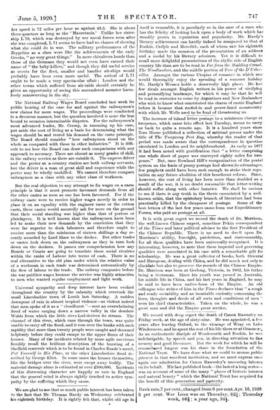We are glad to see that so much public interest
has been taken in the fact that Mr. Thomas Hardy on Wednestay celebrated -his eightieth birthday. It is rightly felt that, whilst old age in • itself. is venerable, it is peculiarly so in the ease of a .man whc has the felicity of looking back upon a body of work which has steadily grown in reputation and popularity. Mr. Hardy's literary achievement can hardly indeed be compared to that of Ruskin, Carlyle and Meredith, each of whom saw his eightieth birthday made the occasion of the presentation of an address and a medal by his literary admirers. Yet it is difficult to recall more delightful presentations of the idyllic aide of English country life than are to be read in Far from the Madding Crowd, The IVoodlanders, and the middle portion of Tess of the D'Unkr- vines. Amongst the various Utopias of romance in which one would thoroughly enjoy the spending of a summer holiday Mr. Hardy's Wessex holds a deservedly high place. He has few rivals amongst English writers in his power of vivifying and personifying landscape, for which it may be that ho will be read in centuries to come by Argentines and Now Zealanders who wish to know what constituted the charm of rustle England before it became that roofed-in and power-lined monstrosity with which Mr. Wells used to be fond of threatening us.


































 Previous page
Previous page